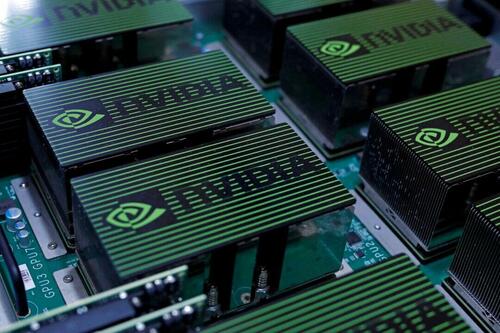2 Chinese Nationals, 2 Americans Charged With Smuggling Nvidia Chips To China
Authored by Frank Fang via The Epoch Times (emphasis ours),
Two Chinese nationals and two U.S. citizens have been charged with a scheme to illegally export advanced Nvidia chips to China in violation of U.S. export controls, the Department of Justice said on Nov. 20.

Li Cham, 38, a California resident, and Chen Jing, 45, who resides in Florida on an F-1 nonimmigrant student visa, are the two Chinese nationals accused of the illegal exporting scheme. The two U.S. citizens are Ho Hong Ning, 34, a Florida resident born in Hong Kong, and Brian Curtis Raymond, 46, who resides in Huntsville, Alabama.
The four men are charged with multiple counts, including conspiracy to violate the Export Control Reform Act, smuggling, and conspiracy to commit money laundering, according to an indictment unsealed on Nov. 19.
Prosecutors allege the four defendants conspired from September 2023 through November of this year to illegally export advanced graphics processing units (GPUs), which have artificial intelligence (AI) applications, through the third countries of Malaysia and Thailand.
The indictment notes that the United States has put export restrictions on cutting-edge GPUs because China is developing supercomputing capabilities for its militarization efforts, including weapon designs and testing, as well as advancing its advanced surveillance tools.
“The indictment unsealed yesterday alleges a deliberate and deceptive effort to transship controlled Nvidia GPUs to China by falsifying paperwork, creating fake contracts, and misleading U.S. authorities,” Assistant Attorney General John A. Eisenberg, from the Justice Department’s National Security Division, said in a statement.
“The National Security Division is committed to disrupting these kinds of black markets of sensitive U.S. technologies and holding accountable those who participate in this illicit trade.”
Prosecutors said the scheme relied on Tampa-based company Janford Realtor, owned by Ho and Li and not involved in real estate, which acted as a front to purchase and export the restricted GPUs to China.
Raymond’s Alabama-based electronics company was also allegedly involved in the scheme, supplying the restricted GPUs to Ho and others for illegal export.
Some 400 Nvidia A100 GPUs were exported in two shipments to China between October 2024 and January this year, prosecutors said.
Two subsequent shipments, involving 10 Hewlett Packard Enterprise supercomputers containing Nvidia H100 GPUs and 50 separate H200 GPUs, were “disrupted by law enforcement and therefore not completed,” prosecutors added.
The defendants were aware that a license was required for the exports, yet none sought or obtained one, according to prosecutors.
The indictment also alleges that the defendants received more than $3.89 million in wire transfers from China to fund their scheme.
According to the indictment, one of these transfers, in March this year, involved $1.15 million, sent from a Hong Kong-based Chinese company to a Bank of America account belonging to Raymond’s Alabama-based electronics company.
Another wire transfer, in November last year, involved $237,248 sent from another Hong Kong-based Chinese company to a Bank of America account belonging to Janford Realtor, according to the indictment.
According to the Justice Department, Ho and Chen appeared in court in the Middle District of Florida and Raymond in the Northern District of Alabama, all on Nov. 19. Li was scheduled to make his court appearance in the Northern District of California on Nov. 20.
Chen’s lawyer declined to comment when contacted by The Epoch Times.
The Epoch Times contacted Ho’s lawyer, but did not receive a response by publication time. The Epoch Times was unable to reach Raymond’s and Li’s lawyers for comment by publication time.
An Nvidia spokesperson told The Epoch Times that the export system is “rigorous and comprehensive.”
“Even small sales of older generation products on the secondary market are subject to strict scrutiny and review,” the spokesperson said. “Trying to cobble together datacenters from smuggled products is a nonstarter, both technically and economically. Datacenters are massive and complex systems, making any smuggling extremely difficult and risky, and we do not provide any support or repairs for restricted products.”

On Nov. 20, Rep. John Moolenaar (R-Mich.), the chairman of the U.S. House Select Committee on the Chinese Communist Party, called for urgent passage of a chip-tracking bill.
“China recognizes the superiority of American AI innovation and will do whatever it must to catch up,” he said. “That’s why the bipartisan Chip Security Act is urgently needed.”
The Chip Security Act would require location verification for advanced AI chips, enforce mandatory reporting from chipmakers on the potential diversion of their products, and task the Department of Commerce with studying additional necessary steps.
In August, two Chinese nationals in California were charged with allegedly shipping tens of millions of dollars’ worth of microchips to China. According to the case’s indictment, the microchips included Nvidia H100 GPUs.
Reuters contributed to this report.
Tyler Durden
Fri, 11/21/2025 – 20:55ZeroHedge NewsRead More




 R1
R1
 T1
T1


